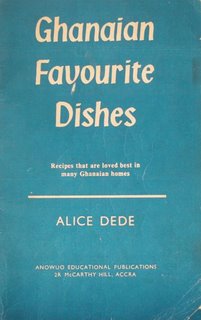Sorry about the long silence in my postings. I've started numerous blogs but keep moving on to the next thing before I put them up: on Ghana's 2nd annual Chocolate Day (Valentine's Day) and Ghana's Chef's Association; on culinary entrepreneurs; on the manioc (cassava) project; on Ghanaian restaurants and fast foods. . . I will eventually share those thoughts but today will say something about contemporary Ghanaian cookbooks.
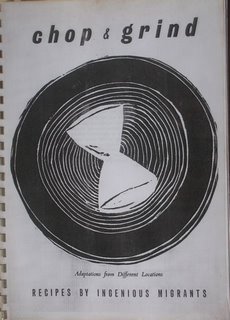
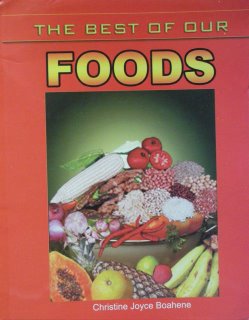
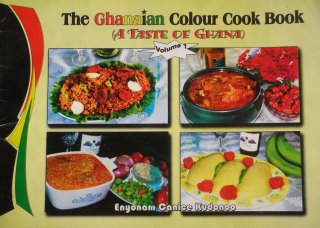
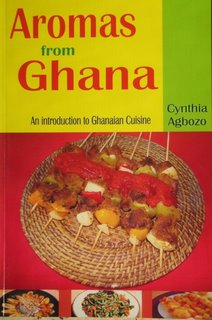
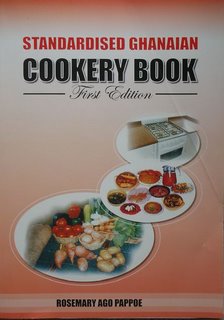
Besides documenting recipes and helping cooks, cookbooks are a great resource for studying social history and material culture. There's currently an explosion of authors self-publishing Ghanaian cookbooks, as well as some Ghanaian presses publishing them. This is good news for African food-lovers. It's a sign that Ghanaians are proud of their food and realize there's a need to write down recipes that are embedded in an oral tradition. There's also much experimentation and modification of traditional recipes occurring, and attempts to find short-cuts for some of the more time-consuming preparation steps. In addition, a growing awareness of the relationship of diet to health is prompting people to adjust their favorite dishes to make them more heart-friendly and healthier. Finally, Ghanaians outside of Ghana want to both re-create their beloved meals when some ingredients or cooking equipment are not available, and introduce versions of them to nonGhanaian friends. They, too, realize that there just aren't cookbooks filling this obvious need.
Each time I begin to write about the phenomenon, I hear about another book, and I'm off to find it, study it, and thus keep putting off sharing here. A good number of such books are written by Ghanaians outside of Ghana, and "launched" both in Ghana and abroad. Two of the books I'm writing about today were donated to our Africa Cookbook Project. One of the books was donated anonymously, but I'd like to publicly thank Nina Chachu for
the second one, Chop & Grind.
The Best of Our Foods by
Christine Boahene was first published in 2003 by Afram Publications in Accra, but this is the first time I've ever run across a copy of it. A week after I saw a few copies in the University of Ghana bookshop in Legon, they had all disappeared again. The author received her degree in Home Economics at Liverpool University College of Calder, and taught many years in the Ghana Education Service before her retirement. Her teaching background shows up in the book, with plenty of advice along with the recipes. It feels like a textbook, with a lot of nutritional and sanitation advice. I especially appreciated that she celebrates "Our Foods" (i.e., West Africa's) and also features a number of West African recipes from outside Ghana, especially from Sierra Leone, The Gambia, Liberia and Cameroon (127 pages, black and white, with drawings).
Another textbook-type publication is
Rosemary Ago Pappoe's Standardised Ghanaian Cookery Book, First Edition (published, 2007, but just launched in March 2008
). It is an ambitious and welcome resource for culinary professionals. Ms. Pappoe is the Domestic Exams Co-ordinator of the Standard Trade Testing and Certification Department of the National Vocational Training Instititute in Ghana. She has put together a standardized cookbook, appropriate for schools training students in good sanitation practices, attractive presentation of foods, and healthy and efficient preparation. It is in many ways a complete course. Included are recipes for soups (14), stews and protein dishes (27), one-pot dishes (10), carbohydrate dishes (35), vegetables (5), sweets and savories (25), fresh fruits, juices and drinks (13), local drinks (4), breakfast dishes (11), and salads (14). Color illustrations throughout show sample presentations of the recipes (152 pages, colored photos). It was no surprise to me to find Barbara Baeta Bentsi-Enchill acknowledged (yes, my collaborator on the regional Ghanaian cookbook we're working on but have yet to locate a publisher for) and her company Flair Catering Services, heavily featured in the "ideal kitchen setup" section.
E
nyonam Canice Kudonoo (author) and Professor Clara Opare-Obisaw (editor) are responsible for
The Ghanaian Colour Cook Book (A Taste of Ghana, Volume 1), published in 2007 by SEDCO. This small book (49 pages) is the kind of book I've been searching for for a long time: an intelligent and authoritative introduction to Ghanaian cuisine. It contains 45 well-illustrated pictures of 25 classic Ghanaian recipes, along with helpful tips and notes. I hope volume 2 will follow soon. Ms. Kudonoo is a former Home Economics teacher, who, interestingly, taught at Flair Catering School (Barbara's school!). The editor teaches here at the University of Ghana (Food and Nutrition), Legon, where I'm based, and I fully intend to look her up very soon.
I've been a nonGhanaian married to a Ghanaian for over 35 years, but it was just in 2008 that I learned of the ISAG: The International Spouses Association of Ghana. In 2005 they put together and published a useful and interesting cookbook called
chop & grind: Recipes by Ingenious Migrants (Adaptations from Different Locations). Its cover features a woodcutting of an
asanka (a traditional clay grinding bowl) and the wooden masher that accompanies it.
Chop & grind is made up of tried and true recipes from 22 individuals who are originally not from Ghana, though many of the recipes are for Ghanaian foods, and many are dishes from elsewhere, along with in ways to recreate other foods using Ghanaian ingredients (183 pages, black and white drawings, woodcuts). This community cookbook is a wonderful resource for the nonGhanaian who finds him- or her-self in Ghana. It appears to have been spear-headed by
Pamela Clarkson Kwami and Celia Marshall. I really hope they, too, take on a volume 2.
Perhaps so many cookbooks were published last year because 2007 was Ghana's 50th birthday (it became the first black African country to achieve independence, in 1957). That's also when
Cynthia Agbozo's Aromas from Ghana: An introduction to Ghanaian Cuisine (DaySprings Publishing, Canada) was released. Her mother was a caterer in Ghana (so by default she apprenticed in her mother's kitchen), and Cynthia is another "can-do" woman who decided to address the paucity of resources on Ghanaian cooking with her 101-page book, clearly illustrated with color photos.

I've been trying to get in touch with another Ghanaian,
Charles Cann, a 2005 commnications graduate of Northwestern University, who has written
Tropical Ghana Delights. I want to find out more about him, and how to get a copy of his cookbook to review. From his PR, it sounds tempting, heavy on fresh tropical fruits. He's apparently "launched" it in several countries. I was here in Ghana when he launched it in February, but didn't hear about it until after the event. He has not yet responded to any of my queries. Charles?
As for the 3 cookbooks at the bottom of this page, I'll save my comments about them for another day. I have a serious complaint for the publisher, but do not want to spoil this celebration of Ghanaian cookbook authors. Similarly, I could make a few critical observations about the above cookbooks, but that's not the point of this posting. I'm sure issues of indexes, tables of contents, organization, measurement information, copy editing, food photography, special ingredients, clarity of information, etc. will resolve themselves over time.
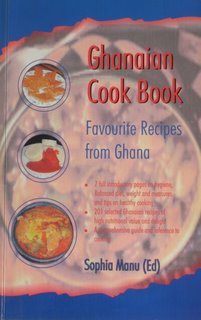
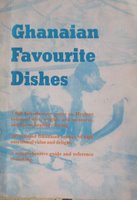
Labels: agbozo, boahene, cann, Flair Baeta Osseo-Asare, isag, kudono, opare-obisaw, pappoe








